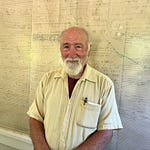“Analy” returns this week as the name of the high school in Sebastopol that serves West County, which served as its name last year. Students will be back at Analy on Thursday.
Chris Meredith is the new Superintendent for West Sonoma County Union High School District. Most recently, Chris was the Director of Human Resources for Windsor Unified School District. He has a lot of challenges in this new job.
I caught up with Chris to talk about his priorities, turning things around in the District after several difficult years as well as his relationship with students and teachers. Chris is nothing if not enthusiastic and optimistic about the new school year. He’s looking forward to seeing students on campus later this week.
Transcript
Dale: Welcome to Sebastopol City Limits. My guest today is the new superintendent of West County High School Union District.
Something like some set of words like that. But Chris Meredith welcome.
Chris: Thank you, Dale. It's West Sonoma County Union High School District.
Dale: Thank you. And what is the main high school's name this year?
Chris: The comprehensive high school in our district will be moving back to the Analy name. So Analy High School.
Dale: And when does school start?
Chris: School starts Thursday on the 11th.
Dale: Wow.
Before we get into some of your background, tell me, what do you remember your first day of high school?
Chris: I went to high school as a freshman at Fairmont Senior High School in West Virginia.
I grew up in Marin and Sonoma County and dealt with a lot of family adversity. And I went to 11 schools in 12 years, including three different high schools. So it was a shock coming from California, just the cultural differences. So it was a challenge for sure.
Then sophomore year, I went to talk about polar opposites in Southern California. Sophomore year, I went to University High School in Irvine. Over 4,000 students from West Virginia to Orange County was a little bit different.
Dale: You were a teacher and a principal in Cloverdale, is that right?
Chris: I taught for 12 years in Santa Rosa city schools. I taught at Piner and Ridgeway. I taught PE and business. I was also a football coach. I spent a little time as an adjunct instructor at the JC, coached a little football there. And then my first administrative position was vice principal with Roseland Collegiate Prep on the Ursuline campus, a 7-12 charter school, college prep.
I did that for two years before becoming the principal at Cloverdale High School, where I served for four years and then just one year at the Windsor district office as the director of HR.
Dale: Okay, great. I have to ask you this question. Why would you want this job?
Chris: Great question
Dale: They've really had a real struggle here and some really tough issues to deal with the last couple years.
Chris: Sure. I've always watched this district from afar. I've got some close friends in the community and some of them are teachers. One of them in particular is a really close friend of mine.
It's an all high school district, which I think is really unique because my experience is all high school with the exception of the two years I spent as the vice principal within Roseland, where I had the 7-8. It's a passion of mine. Obviously spending seven years as a teacher at Ridgeway High School, I saw an opportunity to support not only a comprehensive model, but a continuation model.
And it's a small community. It's a small district, and I know that they've been through some turmoil and I know they needed steady leadership. And to be honest, I've always thought of this district as a dream district for me. And I didn't expect to become a superintendent so soon. When this position came open, I just I had to explore it.
I felt as though. It was the right time, because who knows when this district would have another superintendent vacancy. And I figured with what, I didn't know, having little time at the district office much, like when I became the principal at Cloverdale High School, I would learn and just get to know people, immerse myself in the community. And things would work itself out. When I took over in Cloverdale, they were, their culture and their climate was at a low point and we rebuilt that school. We built relationships and we had a lot of success in a short amount of time. So I don't shy away from a challenge and I'm here to help.
Dale: I think it's fair to say that a lot of people would say it's been at a low point and it's time to start getting to a high point. What are your priorities coming in?
Chris: Yeah, I think some of the glaring priorities, are the reestablishing of positive culture and rebuilding relationships through what was the consolidation and how that affected everybody in our community and then obviously addressing some of our racial discrimination issues and then taking a look at our budget and making sure that we balance it out.
And our fiduciary responsibilities are aligned with our program and our staffing ratios. And so I think we have some work to do there. And then just looking at how this unification study will play out and really getting to know people in this community, everybody from, People within our district to, students and families, alumni, but also our feeder districts.
We have the largest draw of any high school in Sonoma County. And so I've gotta get out and get to know those superintendents and the people at those campuses and the families that send their students to those campuses because ultimately we want those students to come to Analy. And so I think through a process of rounding and really getting to know people that's gonna be, in addition to some of those district priorities, my priorities for this year, really get to know this district, get to know this community and build authentic relationships.
Dale: The part of the community that feels upset, to use that word, is really around El Molino . And from talking to people, it may not actually be just what happened, it was how it happened. Abrupt not really good messaging about what they're doing. Whatever you decide to do in that area, the families there still feel kind of pain from that.
There's a lot of healing that needs to be done, and really just validating people's feelings, and honoring the traditions that evolved over the years is all I can control today.
And we'll see what happens moving forward. But, I've already started to do that and having conversations with people and hearing their concerns, giving them the space to express how they felt about the processes and then reflect. I wasn't a part of the district during that time. And so I can go back and watch board meetings and make sure that, our messaging is as clear as we can be.
And the transparency is there early, early and often.
That's good. So one of the things people don't necessarily fully understand that I've learned is that, the board's decision was to merge two comprehensive high schools so that there was one in the district.
Chris: Correct.
And that splitting resources, at least economically was difficult to have a student body of 600 and a student body of 1200. Is that basically fair?
Yeah. It's expensive to run two comprehensive high schools and the district's been experiencing declining enrollment. So from what I've learned, that was a part of that process and what was considered.
Structural deficit was pretty severe at that time.
Dale: Let's talk about that. A phrase that comes up a lot in board meetings .A structural deficit. What do we mean by that?
Chris: Essentially, just in layman terms, is that your expenditures are exceeding your revenues.
Dale: And it's fixed in a way that it's not taking care of itself.
Chris: Sure. Because we're funded on the local control funding formula, which is a per student average daily allowance. And so through declining enrollment and the way that formula is set up and structured, we get X amount of dollars.
And obviously the declining enrollment reduces the amount of per student ADA that we receive as a district.
Dale: Is declining enrollment the future? Just steady decline here, or is there things that can be done -- I've seen projections of 10 years that, and not just Sonoma county, in other districts, the LA county, things like that.
Chris: I think cost of living plays a big part of that, in the state of our economy and families are looking for more affordable places to raise. Families. And so I think it's also really highlighting and marketing your programs and making sure that you really take input from the community and you're building something that, has options for all different learners.
And I think that's one of the reasons why districts reflect constantly to look at what students they're losing, why are they losing them? And so I have a plan in place for any interdistrict transfer, I'm gonna be meeting with those families. I want to collect data. I wanna collect information.
I wanna build relationships so I can learn why we're losing certain students. And develop a plan to make sure that we can keep our students. And I think part of that is going back to connecting with the feeder schools and really getting to know people out in those communities and look at barriers, barriers to attending our comprehensive high school. And how can we remove those barriers and provide more opportunities?
Dale: One of the obvious ones is the kids that live pretty far out on the coast and they have a long bus ride to school. The Fort Ross area and others. Is that something you're gonna look at?
Chris: Absolutely. And we have a hundred million campus in Forestville, the former El Molino campus. And right now it houses Laguna, which is primarily set up as a continuation high school, but I think there's opportunities to build potentially an alternative school, through learning what types of program and opportunities our students out that way are interested in and provide an opportunity to learn in a different way and really promote engagement for students through a unique program that we could build together.
Dale: Someone one said to me that, in some ways educationally Sebastopol and this county are conservative. They kind of like what they have, but there is some impetus for change now. I feel that,. I don't know if you do, but things you don't just continue things the way they've been. You need to respond to the kind of environment you're in, the changes you have, and businesses have to do that. Schools have to do that.
Chris: It's that evolution. And if you don't stay ahead of it and you don't prepare for it and plan for it, you're gonna be behind the eight ball. So I really wanna look, I wanna be forward thinking with whatever we do.
I think that, obviously it's expensive to run a comprehensive high school. Providing a structure for an alternative diploma track that provides students with more hands-on learning experiences, project-based learning, maker concepts and industry concepts, and linking it back to some of the things at the comprehensive high school with CTE programs and more opportunities to learn beyond the classroom.
So that's the key is getting students out with mentors and internships and work-based learning opportunities so they can explore what life might look like for them outside of high school.
Dale: Let's talk about the students for a minute. They've been in a tough position. There's COVID shutting down schools. There's the merging of the two schools. There was racial discrimination issues on campus that were raised. And students expressed at times a difficulty to feel heard by the administration. How do you create a culture where students feel they belong and that it cares for them and they care for it.
Chris: That's a great question. I think it starts by listening to your students. We're all here for our students and if we don't listen to them and ask them questions and help them inform our decisions, we're leaving 'em out of the picture.
And so I think that's where it starts. I'll be meeting with a group of our student activists. I'll be present on our campuses. I really enjoy talking to high school kids and helping them achieve their goals. And so I think that's where it starts, Dale, is listening to our students and empowering their voice.
Dale (2): How about teachers? We're reading about a shortage of teachers nationwide. Is that something that's impacting West County?
Chris: It's definitely impacting West County and I'm hopeful due to the tentative agreement we put in place and where we restructured the teachers' salary, we're very competitive, if not the most competitive public high school in Sonoma County with our teaching salaries and our benefit contributions. So I think attracting and retaining good quality teachers is a priority. It's getting more difficult to do as there's less teachers embarking on this educational journey and getting into the field.
So I think it's really putting support pieces in place, providing a structure where good educators and learners can grow and then continuing to reflect about our practices and our culture. And I think that's how we're gonna retain our really good teachers and attract new teachers as well.
Dale: You mentioned the district organization plan that was put out before the board. And I guess the board of trustees will be meeting about that in August. So we don't quite know the next stage.
Chris: It may be in September because the important aspect of this is to engage the leaders of all the districts that are involved in a unification study. I think that's an important aspect. It's this isn't a decision that we are making. We advocated for the study, but I think this is a whole West County region initiative that needs to be looked at. So we wanna make sure that we take a thoughtful approach. And I know that our school board, they're connecting with other school board members to discuss priorities and that's where I also will engage and discuss what this could look like with the other superintendents and school leaders in our feeder schools.
Dale: You have so many districts, so many
Chris: right.
Dale: Different ways of carving up both geography and schools. I guess the only comment there is I, there's such an opportunity and need to collaborate regardless of what that structure looks like.
That students arrive to Analy well prepared for that experience. And that level of preparation is consistent out in Guerneville as it is in Gravenstein.
Chris: Absolutely. Important issues there.
Dale: Chris tell me what your Thursday's gonna be like when the school opens? What time do you have to get there?
Chris: Oh, I'll probably arrive early before the students, do some stuff here in the office. And then I plan to be out and about welcoming kids and meeting teachers. And I wanna spend some time on both campuses. So I'm looking forward to it. I spent a year as a director of human resources in the district office, so I need my kid fix. I miss being around the students.
Dale: That's a great thing.
Chris: You asked me. That's one of the reasons I really am excited to be here is, I get to be around high school students. That's the population that we serve primarily with the exception of the special ed consortium, where we do have some of the younger grade levels. Making sure high school kids have an outstanding experience starts on Thursday.
Dale: Okay. And how's the football team gonna be?
Chris: I talked to Dan yesterday. He thinks they're gonna be pretty good.
Dale: All right. Thanks a lot.
Chris: Thanks Dale.













